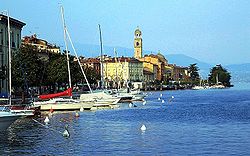Salò
| Salò | |
|---|---|
| Comune | |
| Città di Salò | |

View of Salò and Lake Garda
|
|
| Location of Salò in Italy | |
| Coordinates: 45°36′30″N 10°31′00″E / 45.60833°N 10.51667°E | |
| Country | Italy |
| Region | Lombardy |
| Province / Metropolitan city | Brescia (BS) |
| Frazioni | Barbarano, Campoverde, Renzano, Villa, Cunettone, Serniga |
| Government | |
| • Mayor | Giampiero Cipani |
| Area | |
| • Total | 29 km2 (11 sq mi) |
| Elevation | 65 m (213 ft) |
| Population (30 April 2009) | |
| • Total | 10,640 |
| • Density | 370/km2 (950/sq mi) |
| Demonym(s) | Salodiani |
| Time zone | CET (UTC+1) |
| • Summer (DST) | CEST (UTC+2) |
| Postal code | 25087 |
| Dialing code | 0365 |
| Patron saint | St. Charles |
| Saint day | 30 November |
| Website | Official website |
Salò (Italian: [saˈlɔ]) is a town and comune in the Province of Brescia in the region of Lombardy (northern Italy) on the banks of Lake Garda, on which it has the longest promenade. The city was the seat of government of the Italian Social Republic from 1943 to 1945, with the ISR often being called the "Republic of Salò" (Repubblica di Salò in Italian).
Although legend has it that Salò has Etruscan origins, recorded history starts with the founding by ancient Romans of the colony of Pagus Salodium. There are numerous ruins of the Roman settlement, as shown by the Lugone necropolis (in via Sant’Jago) and the findings (vase-flasks and funeral steles) in the Civic Archaeological Museum located at the Loggia della Magnifica Patria.
During the high Middle Ages, the city shared the same fate as that of Lombardy.
The origins of the municipality of Salò are barely known: its autonomy from Brescia can be dated towards the end of the 13th century or the beginning of the next one, and the most ancient statues conserved by the city authorities are dated 1397.
Previous to the year 1334, the town was part of a sort of federation of town councils of the territory along the western lakeshore of Lake Garda (from Limone down to Desenzano) and the Valsabbia areas, called Riperia Lacus Gardae Brixiensis with the chef-lieu of Maderno.
The federation did not want to form an alliance with Brescia nor with Verona deciding instead to request the help of Venice. Due to the distance of Venice, this strategy did not guarantee the independence of the area and, after a short protectorate under the rule of Venice (from 1336 to 1349), Salò became a stronghold of the Milanese Visconti family. In 1377 Beatrice della Scala, the wife of Bernabò Visconti, wanted Salò to be the capital of the area, reducing the influence of Maderno: the city was provided with solid walls and the castle was built.
...
Wikipedia

